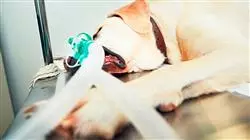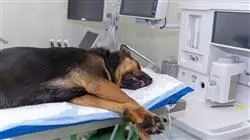University certificate
The world's largest faculty of veterinary medicine”
Introduction to the Program
This training is the best option you can find to specialize in veterinary cardiology and make more accurate diagnoses"

Cardiology of Small Animals is a subspecialty of Internal Medicine with a great development in the last decades. The teachers of this Postgraduate diploma are at the forefront of the latest diagnostic techniques and treatment of cardiovascular diseases in small animals. Thanks to their specialized training, they have developed a useful, practical program adapted to the current reality, a reality that is becoming more and more demanding.
This comprehensive program compiles the different cardiovascular diseases affecting small animals. It starts with a solid development of the basics of cardiovascular physiology, pathophysiology and pharmacology, so often forgotten and so important and useful in daily clinical practice, followed by the optimization of clinical examination and diagnostic tests, and ending with the latest therapeutic protocols and patient monitoring procedures.
This training specializes the general practitioner in an area that is increasingly in demand, partly because of its frequency, partly because of the need for specialization that this area demands.
In all the modules, a gradual exposition of knowledge at the physiological and pathophysiological level has been established, a development of the protocols for approaching patients with cardiovascular diseases with diagnostic and treatment algorithms, as well as the monitoring that should be done in these patients, since many of these diseases are chronic. It compiles the author’s experience, without forgetting scientific rigor and the most important updates based on evidence. It develops the diseases, the action protocols and takes into account the integral approach to the patient, considering the disease, the patient and the owner
in line with evidence-based medicine.
All topics incorporate numerous multimedia material: photos, videos and diagrams, so important in a specialty where imaging techniques are of great importance. Finally, as it is an online Postgraduate diploma, the students are not conditioned by fixed schedules, nor do they need to move to another physical location. All of the content can be accessed at any time of the day, so you can balance your working or personal life with your academic life.
Don’t miss the opportunity to take this program with TECH. It’s the perfect opportunity to advance your career and stand out in an industry with high demand for professionals”
This Postgraduate diploma in Clinical Veterinary Cardiology in Small Animals contains the most complete and up to date educational program on the market. The most important features of the program include:
- The development of case studies presented by experts in Clinical Veterinary Cardiology in Small Animals
- The graphic, schematic, and practical contents with which they are created, provide scientific and practical information on the disciplines that are essential for professional practice
- New developments in Clinical Veterinary Cardiology in Small Animals
- Practical exercises where self assessment can be used to improve learning
- Its special emphasis on innovative methodologies in Clinical Veterinary Cardiology in Small Animals
- Theoretical lessons, questions to the expert, debate forums on controversial topics, and individual reflection work
- Content that is accessible from any fixed or portable device with an Internet connection
This Postgraduate diploma is the best investment you can make in selecting a refresher program to update your veterinary knowledge in cardiology”
The multimedia content, developed with the latest educational technology, will provide the professional with situated and contextual learning, i.e., a simulated environment that will provide immersive training programmed to train in real situations.
This program is designed around Problem Based Learning, whereby the professional must try to solve the different professional practice situations that arise during the academic program. For this purpose, the professional will be assisted by an innovative interactive video system created by renowned experts with extensive experience in Clinical Veterinary Cardiology in Small Animals.
This training comes with the best didactic material, providing you with a contextual approach that will facilitate your learning"

This 100% online program will allow you to combine your studies with your professional work while increasing your knowledge in this field"
Why study at TECH?
TECH is the world’s largest online university. With an impressive catalog of more than 14,000 university programs available in 11 languages, it is positioned as a leader in employability, with a 99% job placement rate. In addition, it relies on an enormous faculty of more than 6,000 professors of the highest international renown.

Study at the world's largest online university and guarantee your professional success. The future starts at TECH”
The world’s best online university according to FORBES
The prestigious Forbes magazine, specialized in business and finance, has highlighted TECH as “the world's best online university” This is what they have recently stated in an article in their digital edition in which they echo the success story of this institution, “thanks to the academic offer it provides, the selection of its teaching staff, and an innovative learning method aimed at educating the professionals of the future”
A revolutionary study method, a cutting-edge faculty and a practical focus: the key to TECH's success.
The most complete study plans on the university scene
TECH offers the most complete study plans on the university scene, with syllabuses that cover fundamental concepts and, at the same time, the main scientific advances in their specific scientific areas. In addition, these programs are continuously being updated to guarantee students the academic vanguard and the most in-demand professional skills. In this way, the university's qualifications provide its graduates with a significant advantage to propel their careers to success.
TECH offers the most comprehensive and intensive study plans on the current university scene.
A world-class teaching staff
TECH's teaching staff is made up of more than 6,000 professors with the highest international recognition. Professors, researchers and top executives of multinational companies, including Isaiah Covington, performance coach of the Boston Celtics; Magda Romanska, principal investigator at Harvard MetaLAB; Ignacio Wistumba, chairman of the department of translational molecular pathology at MD Anderson Cancer Center; and D.W. Pine, creative director of TIME magazine, among others.
Internationally renowned experts, specialized in different branches of Health, Technology, Communication and Business, form part of the TECH faculty.
A unique learning method
TECH is the first university to use Relearning in all its programs. It is the best online learning methodology, accredited with international teaching quality certifications, provided by prestigious educational agencies. In addition, this disruptive educational model is complemented with the “Case Method”, thereby setting up a unique online teaching strategy. Innovative teaching resources are also implemented, including detailed videos, infographics and interactive summaries.
TECH combines Relearning and the Case Method in all its university programs to guarantee excellent theoretical and practical learning, studying whenever and wherever you want.
The world's largest online university
TECH is the world’s largest online university. We are the largest educational institution, with the best and widest online educational catalog, one hundred percent online and covering the vast majority of areas of knowledge. We offer a large selection of our own degrees and accredited online undergraduate and postgraduate degrees. In total, more than 14,000 university degrees, in eleven different languages, make us the largest educational largest in the world.
TECH has the world's most extensive catalog of academic and official programs, available in more than 11 languages.
Google Premier Partner
The American technology giant has awarded TECH the Google Google Premier Partner badge. This award, which is only available to 3% of the world's companies, highlights the efficient, flexible and tailored experience that this university provides to students. The recognition as a Google Premier Partner not only accredits the maximum rigor, performance and investment in TECH's digital infrastructures, but also places this university as one of the world's leading technology companies.
Google has positioned TECH in the top 3% of the world's most important technology companies by awarding it its Google Premier Partner badge.
The official online university of the NBA
TECH is the official online university of the NBA. Thanks to our agreement with the biggest league in basketball, we offer our students exclusive university programs, as well as a wide variety of educational resources focused on the business of the league and other areas of the sports industry. Each program is made up of a uniquely designed syllabus and features exceptional guest hosts: professionals with a distinguished sports background who will offer their expertise on the most relevant topics.
TECH has been selected by the NBA, the world's top basketball league, as its official online university.
The top-rated university by its students
Students have positioned TECH as the world's top-rated university on the main review websites, with a highest rating of 4.9 out of 5, obtained from more than 1,000 reviews. These results consolidate TECH as the benchmark university institution at an international level, reflecting the excellence and positive impact of its educational model.” reflecting the excellence and positive impact of its educational model.”
TECH is the world’s top-rated university by its students.
Leaders in employability
TECH has managed to become the leading university in employability. 99% of its students obtain jobs in the academic field they have studied, within one year of completing any of the university's programs. A similar number achieve immediate career enhancement. All this thanks to a study methodology that bases its effectiveness on the acquisition of practical skills, which are absolutely necessary for professional development.
99% of TECH graduates find a job within a year of completing their studies.
Postgraduate Diploma in Clinical Veterinary Cardiology in Small Animals
Medical care for animals with diseases affecting the heart and arteries requires specialized knowledge in anatomy and histology that we at TECH Global University have carefully compiled. Thanks to the syllabus of this program, students will learn about the mechanisms, pathophysiological consequences and epidemiology of heart failure in order to subsequently approach diagnostic techniques (cardiovascular examination, laboratory tests, cardiac biomarkers and genetic tests) and prescription methods (dietary hygiene management and design of therapeutic or pharmacological treatments). Having mastered these basics, it will be possible to carry out an acute analysis of the patient's clinical history and socialize an adequate interpretation of the general/specific symptomatology, in order to create comprehensive protocols for action that take into account the indications, contraindications and adverse effects that the patient may experience.
Take a Postgraduate Diploma at the world's largest online School of Veterinary Medicine
By taking this Postgraduate Diploma in Clinical Veterinary Cardiology in Small Animals offered by TECH, the professional in this field will be able to profile their skills in the medical management of cardiovascular and chronic cardiorespiratory diseases, as the syllabus includes a set of cases that will confront real situations, where it is necessary to mobilize a myriad of resources for the resolution of different medical conditions. The gradual exposition of the contents, determined by our methodology, also facilitates the adoption of key analytical-interpretative skills for the detection of each type of complication, which, in turn, will be useful for the rapid stabilization of the patient's condition. With this background, the future expert in this field will be able to build diagnostic frameworks from the compilation of pathological structures. In addition, in a more advanced registry, to implement prevention campaigns and promotion of animal health, whose protocols promote the guarantee of quality medical care. All this, always respecting the ethical codes and legal frameworks that regulate the activities of their daily clinical practice.







